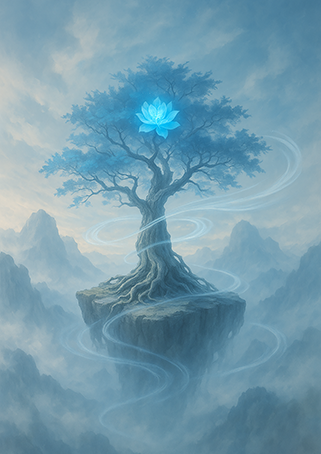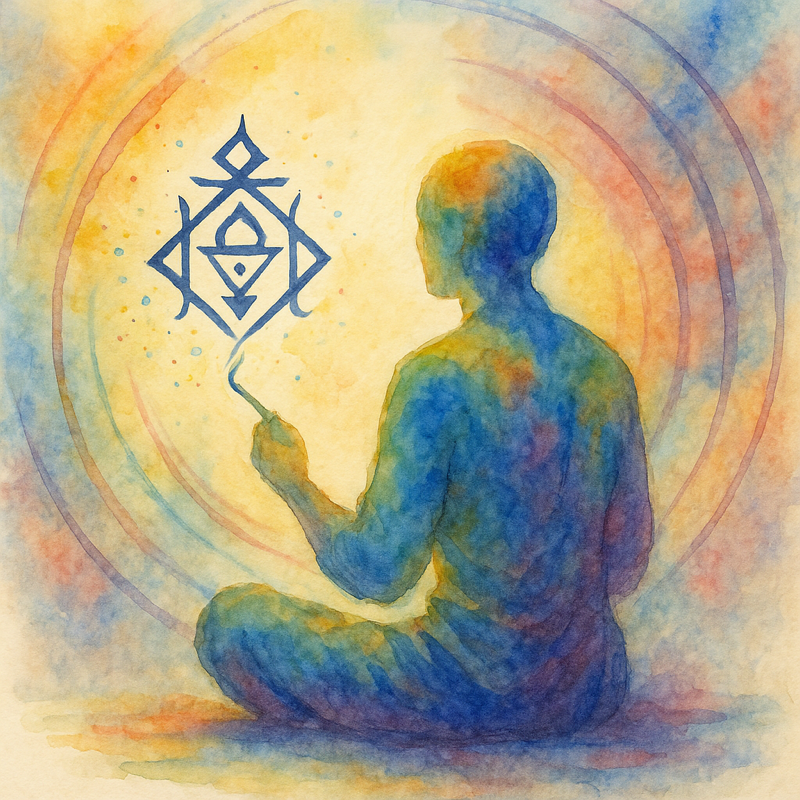Xieyi・The Rootless Tree:100 Verses-Verse 60#443

The poems of “The Rootless Tree” express a fundamental force rooted in harmony with heaven and earth, the cyclical flow of yin and yang, and the infinite potential of existence。
This painting is an expressive “Xieyi” in the tradition of “futu” (spiritual diagrams), passed down for generations in Wudang Mountain, China. It is drawn through a technique where energy flow (xingqi) channels the internal intention into visual form。 In the Taoist world, there exist spiritual and symbolic images called “futu”。
In the Taoist world, there exist spiritual and symbolic images called “futu”。
These are a type of talisman—not merely religious items, but expressive spiritual paintings that act directly on the mind of the viewer。
Since ancient times, many people have placed these Taoist-style “Xieyi” and futu in their homes, studies, or bedrooms, wishing for longevity, health, auspiciousness, and family harmony. Viewing such paintings was not just aesthetic appreciation, but an act of inviting the presence of the Dao into one’s life and tuning the body and mind。
Thus, “Xieyi” is more than artistic expression—it is a medium that bridges the spirit, life, and harmony with the universe。
This kind of artwork is not meant to be seen only with the eyes, but felt with the heart。
It communicates with the Dao, resonates with the qi of nature, and quietly stirs the viewer’s inner self。
Futu and “Xieyi” continue to live on from ancient times to this day as “sacred images that speak to the soul.”
Below, we present the original text of the philosophical poem “The Rootless Tree,” along with a modern Japanese translation and interpretation。
※ The author of “The Rootless Tree,” Zhang Sanfeng (1247–?), is also renowned as the founder of Tai Chi, and it is said that he applied the essence of this work to Tai Chi. As an additional note, we include an interpretation connecting this to the Tai Chi tradition of Wudang Mountain.
Details of Tao Code, Feng Shui and talismans in Xieyi Painting
The composition unfolds in vertical ascension — dense ink grounding the lower field, while soft gold rises like breath. Between them, a pale mist of space suggests the transformation from heaviness to illumination. The brushwork carries the rhythm of inhaling stillness and exhaling light.
This work embodies Ascending Radiance Qi (Sheng Guang Qi) — the energy of awakening, refinement, and enlightenment.
It harmonizes spaces devoted to meditation, contemplation, or study, where inner clarity and spiritual brightness are sought.
The luminous gold corresponds to the Fire element, inspiring vitality and vision, while the shaded ink anchors the spirit in calm awareness.
May this painting serve as a silent talisman — an emblem of the light that dwells in stillness, reminding the viewer that illumination is already within.
The Rootless Tree・Verse 60

▶Original Text
無根樹,花正青,氣隨心動,隨風而行。陰陽和合,氣運無窮,無為無欲,無所不成。
▶Modern Translation
A blue flower blooms on the rootless tree.
Qi follows the mind and rides the wind freely.
When yin and yang are in harmony, qi flows without end.
Without striving or desire, all is achievable.
▶Interpretation
[無根樹,花正青] Blue—the breath of spring, free mind.[氣隨心動,隨風而行] Qi moves with the mind, flows with the wind.
[陰陽和合,氣運無窮] Harmony of yin-yang—qi circulates infinitely.
[無為無欲,無所不成] In desireless inaction, all is fulfilled.
▶Interpretation related to Tai Chi
Freedom begins with letting go.
Mind leads, qi responds, body flows.
Harmonize polarities, nourish vitality.
Follow Nature—achieve without effort.
Copyright © MASAKI WAKABAYASHI. All rights reserved.




